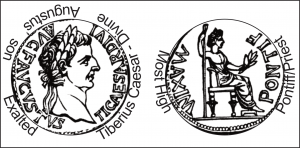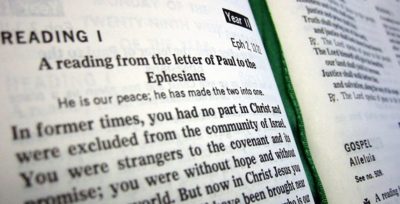Rendering Tribute to Whom Tribute is Due

Sermon Preached on the Twenty-Third Sunday after Trinity, November 12, 2023, at St. Michael the Archangel Anglican Church on the Gospel Lesson: Matthew xxii. 15ff
“Render unto Caesar the things which are Caesar’s; and unto God the things that are God’s.” In the Name of the Father, and of the Son, and of the Holy Ghost. Amen.
Today’s Gospel Reading comes right on the heels of what we discussed three Sundays ago when we looked at Jesus’ teachings during Holy Week (Trinity 20). We see that after Jesus lambasted the chief priests and pharisees with the three parables (the Two Sons, the Tenants, and the Wedding Feast/Garment), they retreated and planned a different way to “entangle Him in his talk” (Matt.22:15). They sent their students (after all those who can’t, teach), but there would be no trapping Jesus in His words. In three days He will be hung on the Cross; time was of the essence; so Jesus wasn’t going to mince words enough to be trapped.
Nevertheless, their attempted plan was to get Jesus wrapped up in one of the most contentious, political arguments of the day: “Is it lawful to give tribute unto Caesar, or not?” The word “tribute,” here, is everything. It refers to a specific census tax that individuals had to pay every year. Romans had a lot of taxes (land tax, customs tax, business tax, and even an income tax), but nothing infuriated the Jewish people more than this census-tribute tax – because it was seen as a tax on themselves reaffirming Rome’s claim over them personally. It was this very tax that led Judas of Galilee to lead a rebellion during the census (Act.5:37). Thus, they thought this would be the perfect topic to trap “Jesus, the prophet from Nazareth of Galilee” (Matt.21:11).
In their minds, no matter how Jesus answered the question, it was a win-win: either the people would hate Him for siding with Rome, or if He went the route of the previous Galilean, Rome would hear His anti-census rhetoric and kill Him as a rebel. But as we know, Jesus does not take the bait, but instead takes the opportunity to teach.
Now, as an aside, we must note that those students sent that day, had to be the Pharisees’ favorite students because they were top notch flatterers (Matt.22:16). But even though their flattery was correct – Jesus was very truthful and not swayed by public opinion – He used it against them to call them out for what they were: “hypocrites.” Then, He specifically asked them for “the coin for the tax” in question, a “denarius” (v.19). He asked for this coin precisely because of who and what was inscribed on it.
Because, when He asked, “Whose image, or icon, is this?” And “What does the superscription say?” (v.20), the answer was a punch in the gut to any faithful Jew since it was a blatant idol. For instance, in the time of Tiberius, the head side had an image of Tiberius with the superscription: “Tiberius Caesar, Son of the Divine Augustus” (in other words “son of god,” since Augustus had been deified). And on the back was the image of a Roman god with the superscription: “Pontifax Maximus” (The Great Roman High Priest). Of course, these hypocrites had no problem bringing this idol into the LORD’s temple.
So, with this idol in their hands, Jesus gives them His answer: “Render unto Caesar the things that are Caesar’s; and unto God the things that are God’s” (v.21). A couple of things happens here. First, He uses the word “render” instead of the original question’s “give.” “Render” means to pay back; it speaks of a debt and obligation. Caesar minted it, and distributed it as part of his economy, so give it back. This tribute wasn’t to be given as a gift, but rendered as a debt for benefits received from the state (cf.Rom.13:1-7;1Pet.2:13-15; 1Tim.2:2).
But this wasn’t the only misunderstanding Jesus addressed in this teaching moment. You see, by asking this question the way they did, it not only revealed that they had forgotten their personal responsibility for working toward the good of society (cf.Jer.29:7), but it more importantly revealed that they had forgotten their role in society as God’s unique creation and people. They had forgotten whose image and likeness they were to bear.
So, secondly, Jesus calls them out for devolving into earthly minded, belly-devoted idolaters revering the things of the earth more than the Creator who created, called, and commissioned them to reflect His nature to the nations (cf.Phil.3:19; Hos.4:7). This is why they had forgotten that everything they were trying to hold on to, actually belonged to God, and God was telling them, “Some of the stuff that belongs to me, I have entrusted to you and I want you to give part of it to those governing for the good of society.” Everything we have belongs to God and we ought to make sure the way we use it reflects His values, will, and purposes, or we will be no better than those hypocrites. For “the hour cometh and now is when the true worshippers shall worship the Father in spirit and in truth. For the Father seeketh such to worship Him” Amen.



